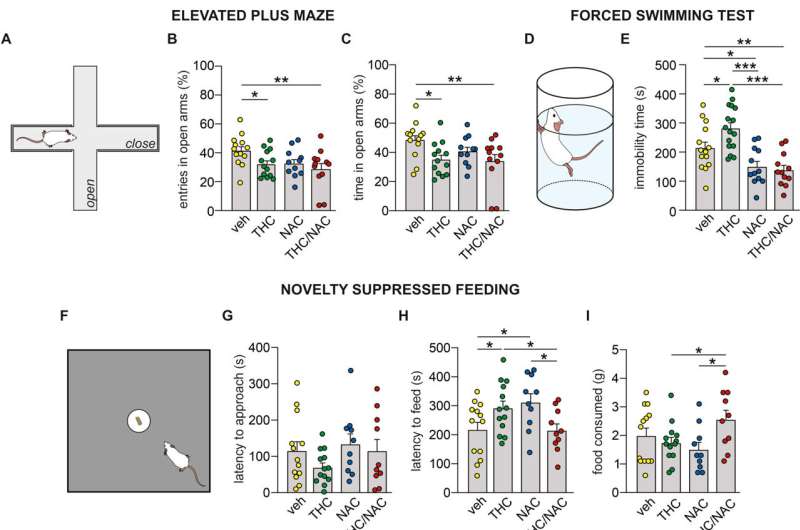
Effects of NAC on anxiety and depressive symptoms induced by THC exposure during adolescence. Credit: Biological Psychiatry Global Open Science (2024). DOI: 10.1016/j.bpsgos.2024.100361
Western researchers have discovered that an over-the-counter natural health product may help counteract the negative effects of heavy cannabis use in adolescents aged 12 to 17, including depression, anxiety and decreased motivation in adulthood.
In a new article published in Biological Psychiatry Global Open ScienceMarta De Felice and Steven Laviolette, researchers at the Schulich School of Medicine & Dentistry, have shown in animal models that interventions using the antioxidant N-acetylcysteine (NAC) can mitigate the detrimental mental health effects of chronic cannabis use later in life. NAC is available in Canada as an over-the-counter natural health product and is commonly used to treat acetaminophen overdoses.
Their findings also shed light on the mechanisms behind these mental health effects and offer hope for future therapeutic strategies.
Sometimes referred to as “amotivational syndrome,” chronic cannabis use in adolescents can result in lack of motivation, decreased enjoyment of daily activities, and other depressive effects. Currently, there is no known intervention strategy available to counteract these negative psychiatric side effects.
The study found that NAC, an amino acid also known for its antioxidant properties and support for respiratory and liver health, effectively counteracts oxidative stress, which is caused by an imbalance of unstable atoms that can damage cells and antioxidants, leading to various diseases. NAC also reduces high levels of glutamate, an excitatory neurotransmitter that sends chemical signals from neurons to cells.
In this study, researchers tested the effectiveness of NAC in animal models. According to De Felice, lead author and a postdoctoral researcher in the department of anatomy and cell biology, the results showed that NAC acts as a protective agent by neutralizing oxidative stress and regulating glutamate levels to maintain normal function of the part of the brain known as the nucleus accumbens.
“The nucleus accumbens is a brain region that regulates mood disorders and addiction and is responsible for motivated behavior,” De Felice said. “That’s why testing NAC in this area was so relevant in this study, as it’s a critical area for mediating the effects of drugs that are perceived as rewarding.”
By normalizing the function and activity of this brain region, the researchers believe it may prevent the development of the depressive and anxiety-related phenotype, which are genes responsible for these traits.
The study findings also provide further insight into how cannabis exposure negatively impacts the brain’s ability to respond appropriately to motivational cues, due to cannabis’ impact on oxidative processes and neurotransmitter function in the brain region.
“One of the exciting things is that we’ve identified one of the important mechanisms behind that phenomenon by identifying an increase in oxidative stress and glutamate toxicity in the brain,” said Laviolette, a professor in the department of anatomy and cell biology. “The NAC intervention was very effective in preventing many of those effects, and it’s also considered a very safe and accessible supplement.”
The researchers hope to translate this into a clinical trial within the next few years and develop an effective intervention strategy to help adolescents address the long-term mental health consequences of cannabis exposure.
More information:
Marta De Felice et al, The effects of cannabinoid exposure in adolescents on striatal anxiety and depressive pathology are prevented by the antioxidant N-acetylcysteine, Biological Psychiatry Global Open Science (2024). DOI: 10.1016/j.bpsgos.2024.100361
Quote: Researchers find potential therapeutic agent to counteract mental health effects of cannabis (2024, July 29) Retrieved July 29, 2024 from https://medicalxpress.com/news/2024-07-potential-therapeutic-counteract-mental-health.html
This document is subject to copyright. Except for fair dealing for private study or research, no part may be reproduced without written permission. The contents are supplied for information purposes only.
 Healthy Famz Healthy Family News essential tips for a healthy family. Explore practical advice to keep your family happy and healthy.
Healthy Famz Healthy Family News essential tips for a healthy family. Explore practical advice to keep your family happy and healthy.


